Food allergies in Dogs and Cats: Try this recipe
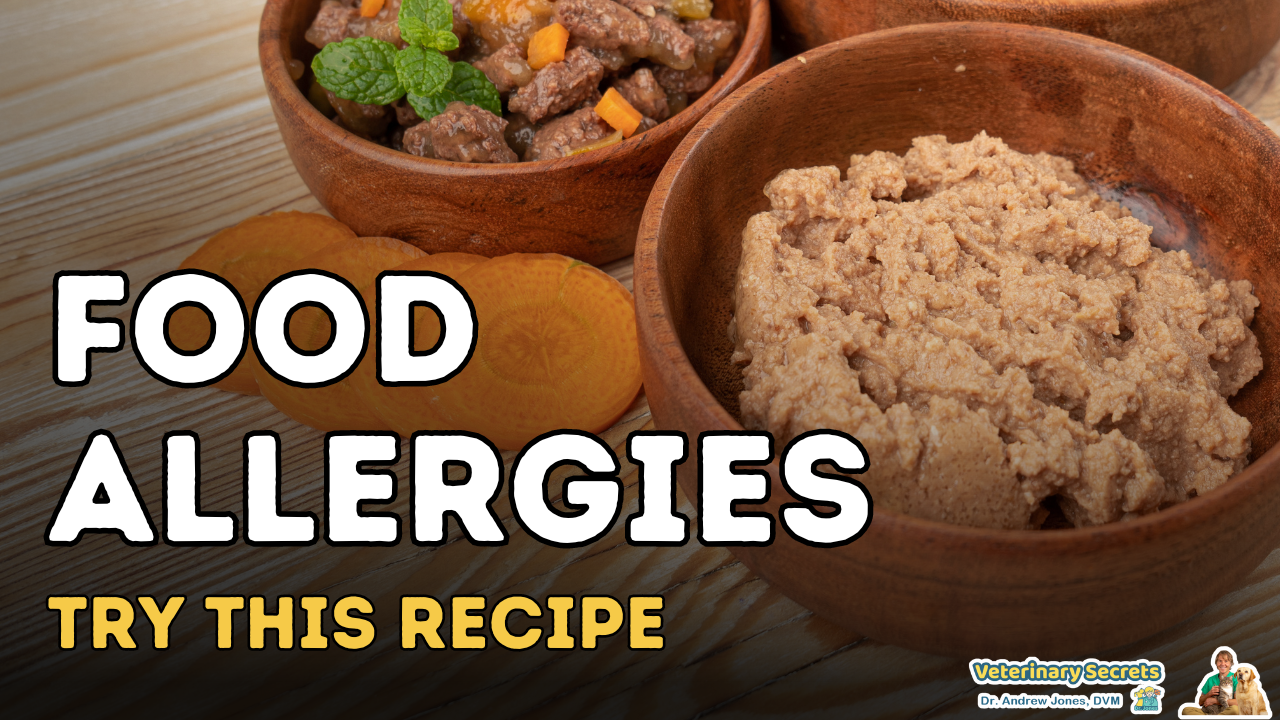
You have not likely done a proper food trial for your allergic dog or cat. In this blog article I’ll show you an easier way.
It is much better for your pet to stop the scratching by changing diet than having to give an ARRAY of treatments for environmental allergy.
You do though need to manage the underlying inflammation, and our supplements has been shown to be beneficial for doing exactly that.
We now have an awesome supplements which is helping many a dog and cat deal with inflammatory skin disease
Understanding Pet Food Allergies: How Supplements Can Help
Pet food allergies can be a significant concern for many pet owners. Allergic reactions to food can manifest in various ways, including itchy skin, digestive upset, and chronic ear infections. Understanding and managing these allergies often involves a multi-faceted approach, including dietary changes and supplements. In this article, we’ll explore common food allergies in pets and recommend four key supplements that can help alleviate symptoms and support overall health: Probiotics, Curcumin, Omega-3 Fatty Acids, and Digestive Care Chews.
Understanding Food Allergies in Pets
Food allergies occur when a pet’s immune system mistakenly identifies a protein or other component in their food as harmful. This reaction triggers various symptoms that can impact a pet’s quality of life. Common signs of food allergies in pets include:
- Itchy, inflamed skin
- Gastrointestinal upset (vomiting or diarrhea)
- Chronic ear infections
- Paw licking or chewing
Managing these allergies involves identifying and eliminating the allergen from the pet’s diet. However, supplements can play a crucial role in reducing inflammation, supporting gut health, and improving the overall well-being of pets with food allergies.
1. Probiotics: Enhancing Gut Health
Benefits: Probiotics are beneficial bacteria that support gut health by maintaining a healthy balance of microorganisms in the digestive tract. For pets with food allergies, probiotics can:
- Improve Digestive Function: By enhancing gut flora, probiotics help stabilize digestion and reduce symptoms like diarrhea and vomiting.
- Strengthen Immune Response: A healthy gut microbiome supports overall immune function, which can help reduce allergic reactions.
- Reduce Inflammation: Probiotics can help lower inflammation in the gut lining, which may alleviate symptoms of food allergies.
How They Help: Probiotics can be especially useful for pets who have developed gastrointestinal issues as a result of food allergies. Regular supplementation can help restore balance to the digestive system and improve overall health.
Dr. Jones’ Ultimate Probiotic Formula for Dogs and Cats
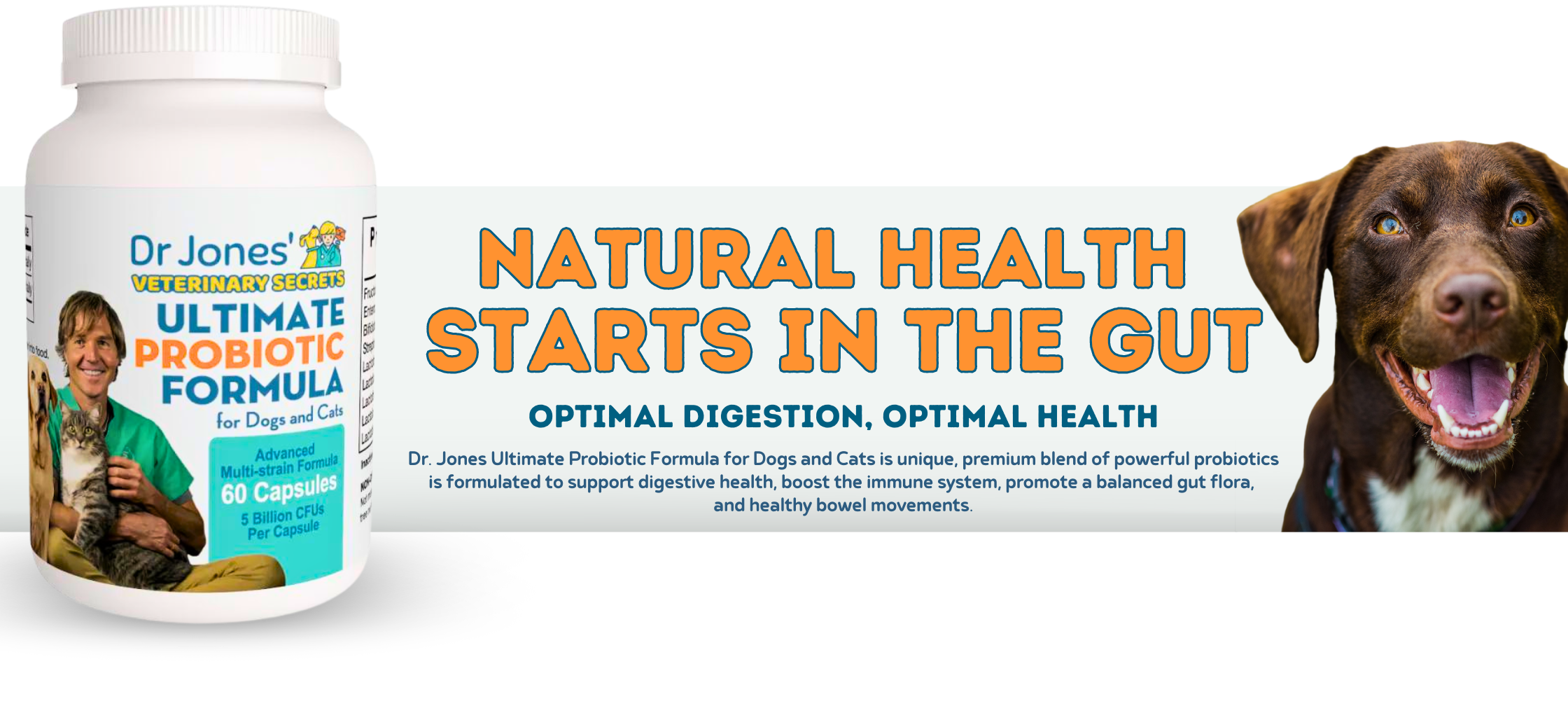
2. Curcumin: Reducing Inflammation
Benefits: Curcumin is the active compound in turmeric and is known for its powerful anti-inflammatory and antioxidant properties. For pets with food allergies, curcumin can:
- Decrease Inflammation: Curcumin helps to reduce inflammation in the skin and digestive tract, alleviating symptoms like itching and discomfort.
- Support Immune Health: By reducing chronic inflammation, curcumin supports a balanced immune response, which can help mitigate allergic reactions.
- Promote Skin Health: Its anti-inflammatory properties can improve skin conditions related to food allergies.
How It Helps: Curcumin can be beneficial for pets suffering from severe allergic reactions or chronic inflammation. Incorporating curcumin into your pet’s supplement regimen can help manage and reduce the inflammation caused by food allergies.
Relieve your pet’s allergies with our trusted vet-approved supplements. Shop today for better health and well-being.
Dr. Jones’ Ultimate High Absorption 95% Curcumin for Dogs and Cats
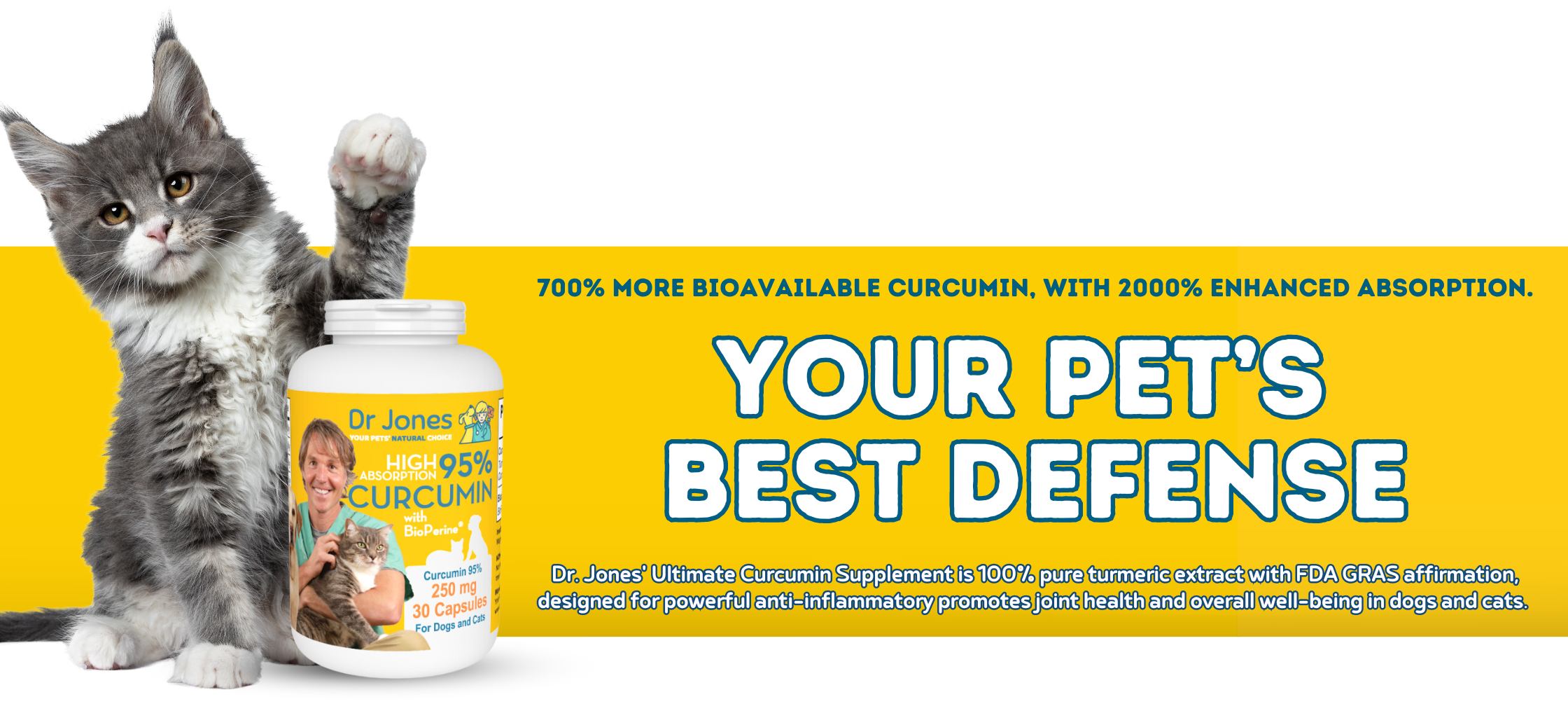
3. Omega-3 Fatty Acids: Supporting Skin and Coat Health
Benefits: Omega-3 fatty acids, commonly found in fish oil and flaxseed oil, are essential for maintaining healthy skin and coat. For pets with food allergies, omega-3 fatty acids can:
- Reduce Itching and Inflammation: Omega-3s have anti-inflammatory properties that can help soothe itchy, inflamed skin.
- Support Skin Barrier Function: These fatty acids help maintain a healthy skin barrier, which is crucial for preventing allergens from affecting the skin.
- Improve Overall Health: Omega-3s support overall health, including heart and joint health, making them a valuable addition to any pet’s diet.
How They Help: Omega-3 fatty acids can be particularly effective for pets with skin allergies, helping to alleviate symptoms and improve skin condition over time.
Say goodbye to your pet’s allergies with our expert-approved supplements. Order now for lasting relief and a joyful pet.
Dr. Jones’ Ultimate Omega 3 Formula for Dogs and Cats

4. Digestive Care Chews: Supporting Digestive Health
Benefits: Digestive care chews often contain a blend of ingredients designed to support digestive health. These chews can be particularly helpful for pets with food allergies by:
- Promoting Healthy Digestion: Ingredients like enzymes and prebiotics in digestive care chews help break down food more efficiently, which can reduce gastrointestinal symptoms.
- Supporting Gut Health: Chews may contain ingredients that support a healthy gut microbiome and reduce inflammation.
- Enhancing Nutrient Absorption: By improving digestive function, digestive care chews help ensure that your pet absorbs essential nutrients effectively.
How They Help: Digestive care chews can be a convenient and effective way to support your pet’s digestive health, particularly if they experience issues like bloating, gas, or diarrhea related to food allergies.
Help your pet breathe easy with our vet-approved allergy relief supplements. Shop now for a healthier, happier pet.
Dr. Jones’ Complete Digestive Care Soft Chews
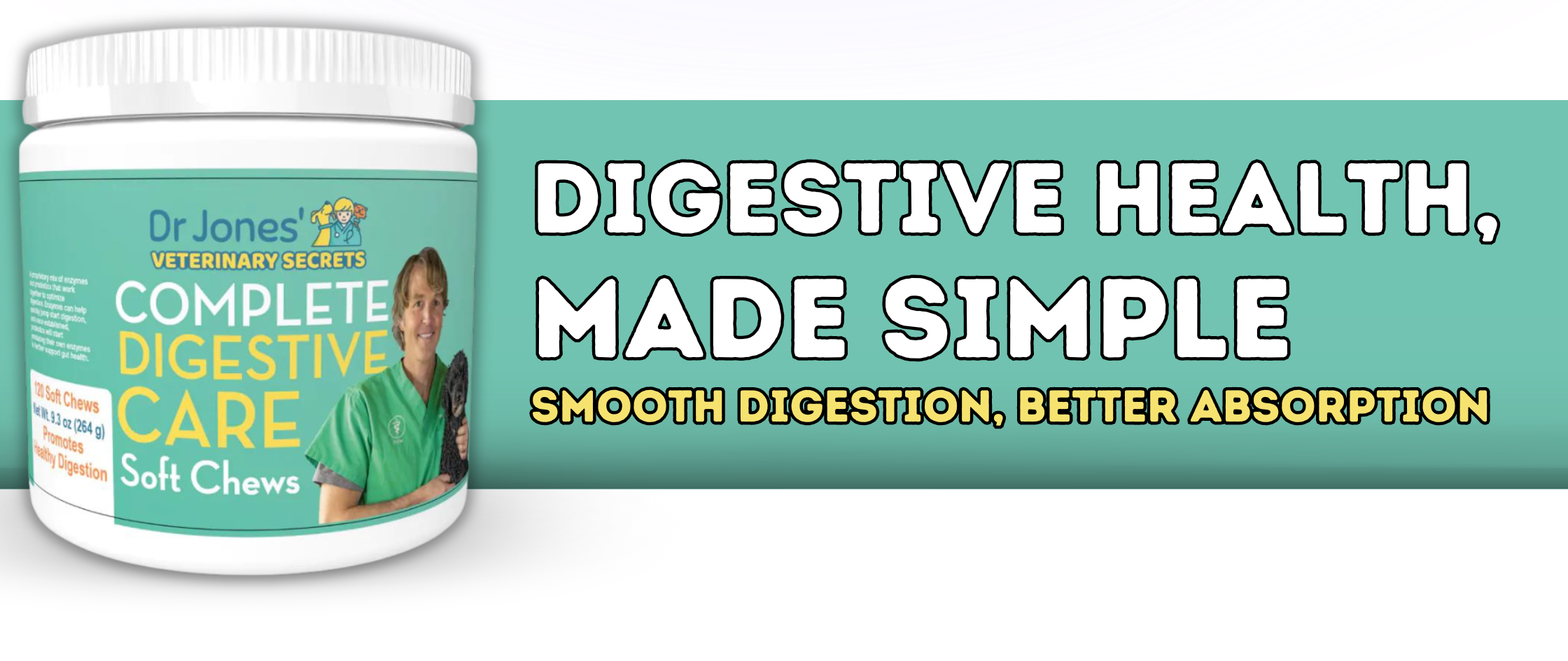
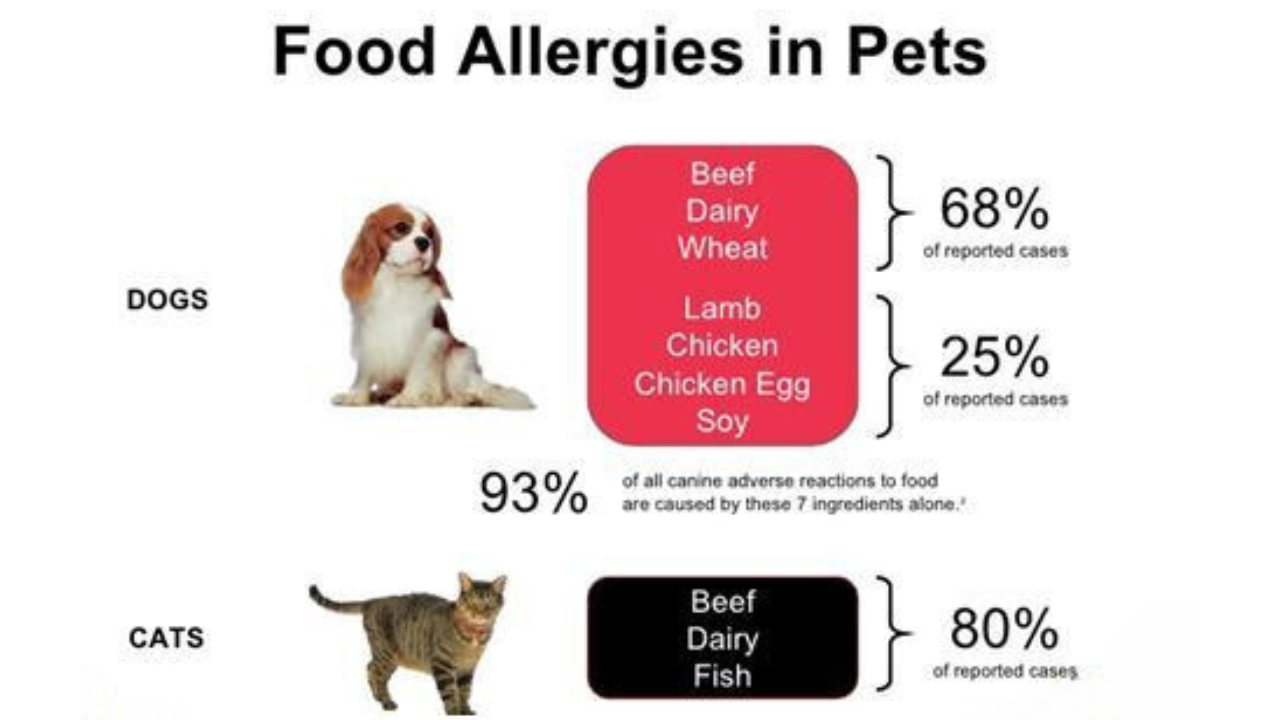
Rule Out Dog and Cat Food Allergy with a Food Trial
Up to 15% of dogs and cats can have a food allergy.
“The most common food allergens in dogs and cats are proteins…”
Common Food Allergens:
- In Dogs: Dairy, beef, chicken, chicken eggs, soy, or wheat gluten. Virtually any food ingredient can produce an allergy, but proteins are the most common culprits. Other substances and additives can also be responsible.
- In Cats: Beef, fish, chicken, and dairy are the most common allergens. Lesser common ones include soy, wheat, gluten, as well as coloring and preservatives.
Commercial Diets
There are no diets that are completely “hypoallergenic,” meaning they will not cause allergies. The closest option we have are hydrolyzed diets that can be purchased through veterinarians. Dogs and cats can be allergic to nearly any protein or carbohydrate ingredient found in pet food.
Diagnosis of Food Allergies
There isn’t an easy test. While many tests using blood, saliva, and even hair can be performed by a veterinarian or purchased by a pet owner online, there is no proof that they work. None of the currently available tests have been shown to be accurate.
The “gold standard” for diagnosing food allergies is the dietary elimination trial.
To be a true elimination trial, this special diet must not contain any ingredients your pet has eaten in the past. It also requires that no other foods, treats, or supplements be fed during the trial period, including flavored vitamins and certain parasite preventives.
If your pet’s allergy symptoms resolve while on the food trial, the next step is to perform a food challenge by reintroducing the old food. If your pet’s symptoms resolve with the food trial and return within one week of a food challenge, your dog or cat has been definitively diagnosed with a food allergy.
Veterinary Diets
Veterinary hydrolyzed protein diets involve breaking down protein molecules to a size too small to be recognized by your pet’s immune system (e.g., Hill’s Prescription Diet z/d, Royal Canin Hypoallergenic Hydrolyzed Protein, and Purina ProPlan Veterinary Diets HA Hydrolyzed).
Rule Out Food Allergy with a Simple Homemade Dog Food Trial
- Ingredients:
- 1/3 Turkey (1 lb), chopped and cooked
- 1/3 Carb (Brown Rice – 2 cups), cooked
- 1/3 Veggie (e.g., Kale – 2 cups), cooked with turkey, or frozen mixed veggies (1 cup)
- Sunflower Oil (2 tablespoons)
- Krill Oil, 1000mg
- Calcium, 1 teaspoon (1000mg) – This is less critical for a food trial and is only really needed if this diet is being fed long-term. If adding in, consider the powder, as many dogs have allergies to eggs (i.e., avoid eggshells).
Feeding Instructions: For a 50 lb dog, feed 1/2 of this recipe twice a day (2 cups, twice daily).
Dr. Jones’ All-Natural Pet Supplements
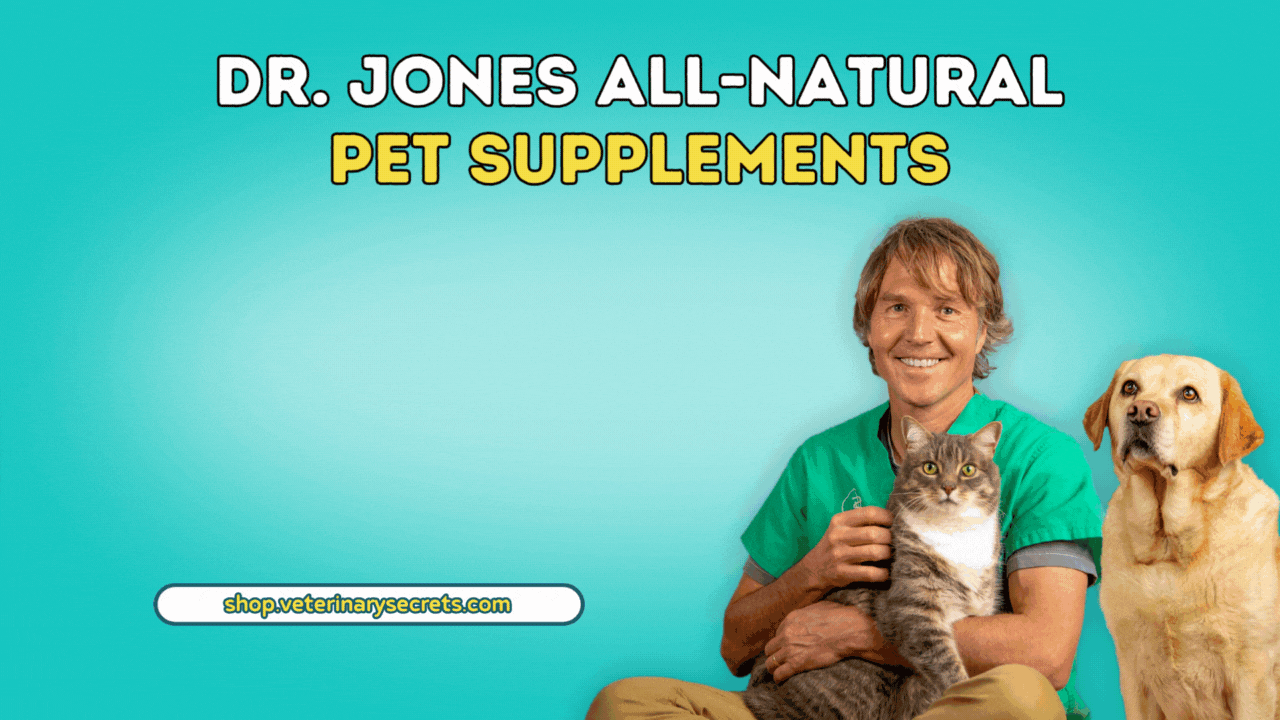
Simple Homemade Cat Food Trial
- Ingredients:
- Turkey (1 lb), chopped and cooked
- Sunflower Oil (1 tablespoon)
- Krill Oil, 1000mg
- Taurine, 500mg
- Calcium, 1 teaspoon (1000mg) – This is less critical for a food trial and is only really needed if this diet is being fed long-term.
Feeding Instructions: For a 10 lb cat, feed 1/2 cup of this recipe twice a day. This equates to 1/4 lb (115 grams), twice daily.
Feeding Duration
- For Dogs: Feed this as the ONLY food for a minimum of 6 weeks, ideally for 12 weeks. 80% of dogs respond by 6 weeks.
- For Cats: Feed for a minimum of 8 weeks, ideally 12 weeks.
